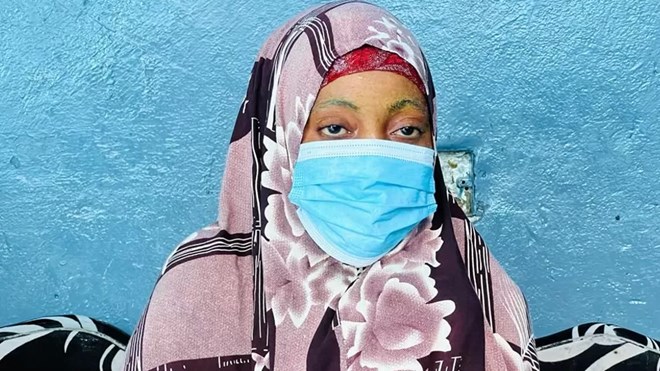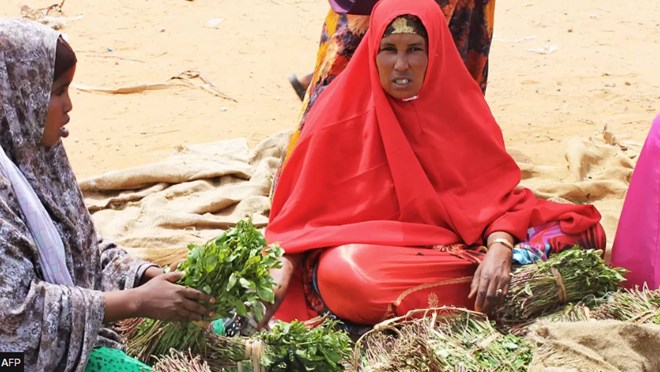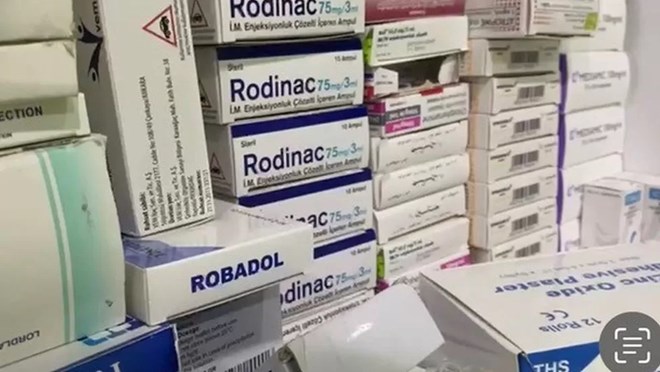
By Fathi Mohamed Ahmed
Tuesday December 27, 2022

Amino Abdi has spoken out about her addiction hoping to reduce taboos around the issue
It was the discovery of the body of a 22-year-old woman on the streets of the Somali capital, Mogadishu, last year that brought into the open the problem of female drug addiction in the city. Health workers said she died from an opioid overdose.
Friends of the social media influencer said she had been injecting drugs for a long time. They said she was high when she recorded some of her popular TikTok videos.
Police have registered an increase in substance abuse in Mogadishu and elsewhere in Somalia, including among women. They say people are turning to new types of drugs.
Whereas they used to chew the narcotic leaf khat - which is not illegal - drink alcohol, sniff glue or smoke hashish, more and more people are abusing opioids which they inject directly into their veins. These include morphine, tramadol, pethidine and codeine.
In early December, police seized a large consignment of prescription drugs, mainly opioids, at Mogadishu's international airport. They arrested the importers."Pills and injectable drugs are especially popular with young women and girls," said a doctor in Mogadishu, who asked not to be named because of the sensitivity of the subject.
"Many of these substances are addictive and they are readily available to buy without prescription in pharmacies all over the city."
'I started sleeping in cars'
Another popular drug used by young women is a form of chewing tobacco known as "tabbuu", which can cause mouth and throat cancer.
Amino Abdi, 23, has been abusing drugs for the past five years. Although female drug addiction is a taboo subject in Somalia, she has decided to speak about it openly to the BBC in the hope that she can help break the silence and reduce prejudice.
"I started off chewing tabbuu with the girls I lived with," she says.
"They were a bad influence on me. I became addicted to tobacco then moved on to harder drugs, especially those I could inject intravenously, mainly tramadol and pethidine."
Ms Abdi says her drug use skyrocketed after she started having problems with her husband. She is now divorced and lives with her young daughter.
"My ex is the reason I became addicted to hard drugs. My addiction got so bad that I lost my mind. I started sleeping in cars and on the streets."
Ms Abdi is trying to come off drugs but says it is very difficult to do so because there are no proper rehabilitation centres in Somalia to manage her withdrawal.
She says it is impossible to stop all the drugs at the same time. She has managed to reduce her habit of injecting opioids but still chews tobacco and smokes shisha.
Parents, especially mothers, are desperately worried about the growing drug problem among their daughters, some of whom are still at school.

Khadijo Adan noticed her 14-year-old daughter was behaving in an unusual way.
"She was sleeping at strange times and acting out of character," she says.
"One day I found tramadol pills and chewing tobacco in her bag. I confronted her and she told me she had started taking drugs because of peer pressure."
Ms Adan sent her child to live in a centre run by Muslim sheikhs. She is no longer taking drugs because it is impossible for her to access them there.
Many parents send their "problem" children to such institutions, especially those with mental illnesses, those involved in crime or drugs and those suspected of being gay.
Serious abuses have taken place in some centres, including the chaining and beating of inmates.
Street children at risk
As it struggles to cope with the worst drought in 40 years and more than three decades of conflict, Somalia's limited resources are unable to cover the most basic of human needs, let alone tackle problems like drug addiction.
The Green Crescent Society visits schools and universities to warn students about different types of addiction, including substance abuse, gambling, gaming and social media.

The fresh leaves of khat, popular in Somalia, have a mild stimulating effect when chewed
Sirad Mohamed Nur runs the Mama Ugaaso Foundation, which focuses on drug abuse among young people, including girls.
"We do our best to discourage the youth from taking drugs by holding awareness programmes which highlight the health risks associated with substance abuse.
"We also lobby the government to step in and do something. But this is not enough. Drastic measures are needed to prevent this scourge from getting out of hand, especially among street children."
According to the Ministry of Women and Human Rights Development, more than 40% of street children take drugs.
About a fifth of street children in Somalia are girls. Some 10% are under six years old, some as young as three.
Although khat, glue and chewing tobacco are the most common substances abused by street children, a study conducted by the ministry found that nearly 10% use opioids and about 17% use sleeping tablets.
Increased drug abuse among marginalised youth has led to an increase in crime, including violence against women and girls.
According to the research body, Somali Public Agenda, it has also led to the recent phenomenon of street gangs, known as "Ciyal Weero", which have been striking terror across Mogadishu.
In some cases, drugs are used to take advantage women such as in the south-western city of Baidoa, where a woman was reportedly raped after being given an opioid.
There is a risk that the rise in intravenous drug-taking will overturn Somalia's relatively low prevalence of HIV and Aids.
"The recent growth of people injecting drugs, especially opioids, is putting a whole new group of Somalis at risk of catching the virus," says Dr Sadia Abdisamad Abdulahi, the HIV programme manager at the Somali health ministry.
Crackdown on chemists
Health professionals say one of the most effective ways of tackling the opioid problem is to target the people who sell the drugs, most of whom are pharmacists.
A few small organisations are trying to fill the gap by spreading awareness about the dangers of drugs.

Pharmacies have been making good money from selling painkillers and opioids to young people
Police have started to crack down on them.
A pharmacist who did not want to give his name says he and his colleagues are not at all happy about the police intervention.
"I have run a pharmacy in Mogadishu for many years. It used to be so easy to sell drugs to young people, including girls, partly because nobody knew what kind of effect the drugs would have on them," he said.
"We used to sell to everyone and we made good money.
"But parents are now working with the police who have started to monitor and sometimes arrest us. We now fear selling drugs to young people and are losing income as a result."
By speaking out about female drug abuse, brave young women like Amino Abdi and mothers like Khadijo Adan have taken the important first step of bringing the issue into the open.
Police intervention and drug awareness programmes will also help, but without more resources and attention, it is unlikely the problem will go away anytime soon.
Fathi Mohamed Ahmed is the chief editor of Bilan Media, an all-female news outfit in Somalia.